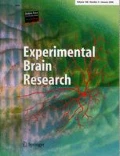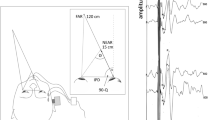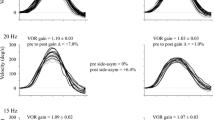Abstract
We measured horizontal and vertical eye positions, using binocular search coils, in three humans. Subjects could maintain vergence by means of audio biofeedback. Feedback consisted of a pair of audio tones, one variable and one fixed at a reference frequency. The variable tone was controlled by instantaneous vergence and provided immediate feedback on the vergence state. The reference frequency, which they attempted to match, was set to correspond to a target distance of either 0.34 m or 0.14 m. Subjects could maintain vergence consistently, even while undergoing lateral motions at 0.5 Hz and 0.2 g peak acceleration in darkness. There was also a consistent tendency for the eyes to deviate downward during near vergence. The results may be useful in experiments in which one wishes to control vergence without providing a visual reference which might inhibit conjugate eye movements.
Similar content being viewed by others
References
Carpenter RHS (1988) Movements of the eyes. 2nd edn. Pion, London, p 103
Ciuffreda KJ, Goldrich SG, Neary C (1982) Use of eye movement auditory biofeedback in the control of nystagmus. Am J Optom Physiol Opt 59:396–409
Cornsweet TN, Crane HD (1973) Training the visual accommodation system. Vision Res 13:713–715
Enright JT (1989) Convergence during human vertical saccades: probable causes and perceptual consequences. J Physiol (London) 410:45–65
Heuer H, Dunkel-Abels G, Brüwer M, Kröger H, Römer T, Wischmeier E (1988) The effects of sustained vertical gaze deviation on the resting state of the vergence system. Vision Res 12:1337–44
Heuer H, Owens DA (1989) Vertical gaze direction and the resting posture of the eyes. Perception 18:363–77
Hirons R, Yolton RL (1978) Biofeedback treatment of strabismus: case studies. J Am Optom Assoc 49:875–82
Hokoda SC, Ciuffreda KJ (1983) Theoretical and clinical importance of proximal vergence and accommodation. In:Schor CM, Ciuffreda KJ (eds) Vergence eye movements: basic and clinical aspects. Butterworths, Boston, pp 75–97
Hung GK, Ciuffreda KJ, Carley CA, Fang P, Menditto S (1988) Auditory biofeedback to control vertical and horizontal eye movements in the dark. Itnvest Ophthalmol Visual Sci 29:1860–65
Jaschinski-Kruza W (1990) Effects of stimulus distance on measurements of dark convergence. Ophthal Physiol Optics 10:243–251
Letourneau JE (1976) Application of biofeedback and behavior modification techniques in visual training. Am J Optom Physiol Opt 53:187–90
McLin LN, Schor CM (1988) Voluntary effort as a stimulus to accommodation and vergence. Invest Ophthalmol Visual Sci 29:1739–46
Paige GD (1991) Linear vestibulo-ocular reflex (LVOR) and modulation by vergence. Acta Otolaryngol (Suppl) 481:282–86
Paige GD, Tomko DL (1991) Eye movement responses to linear head motion in the squirrel monkey. II. Visual-vestibular interactions and kinematic considerations. J Neurophys 65:1183–96
Schor CM, Ciuffreda KJ (1983) Vergence eye movements: basic and clinical aspects. Butterworths, Boston
Shelhamer M, Merfeld DM, Mendoza JC (1994) The gain of the linear vestibulo-ocular reflex is independent of vergence. Presentation at the 18th Bárány Society Meeting, Uppsala
Snyder LH, Lawrence DM, King WM (1992) Changes in vestibulo-ocular reflex (VOR) anticipate changes in vergence angle in monkey. Vision Res 32:569–75
Takeda T, Neveu C, Stark L (1992) Accommodation on downward gaze. Optom Vis Sci 69:556–61
Van Brocklin MD, Vasche TR, Hirons RR, Yolton RL (1981) Biofeedback enhanced strabismus therapy. J Am Optom Assoc 52:731–36
Author information
Authors and Affiliations
Rights and permissions
About this article
Cite this article
Shelhamer, M., Merfeld, D.M. & Mendoza, J.C. Vergence can be controlled by audio feedback, and induces downward ocular deviation. Exp Brain Res 101, 169–172 (1994). https://doi.org/10.1007/BF00243228
Received:
Accepted:
Issue Date:
DOI: https://doi.org/10.1007/BF00243228




